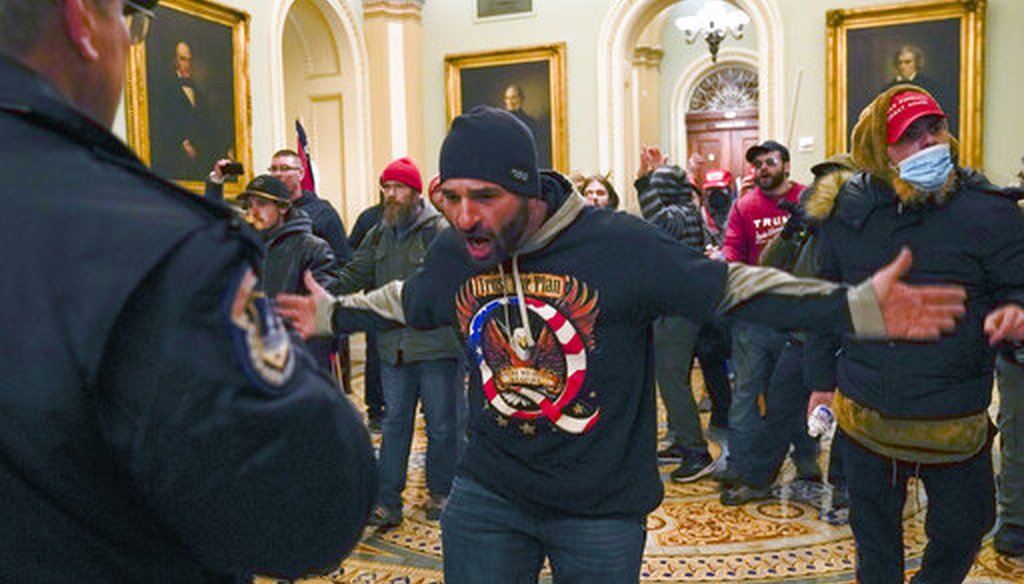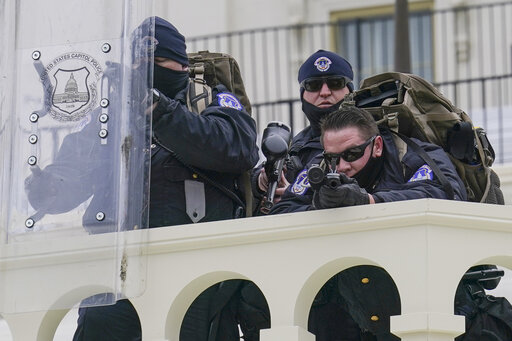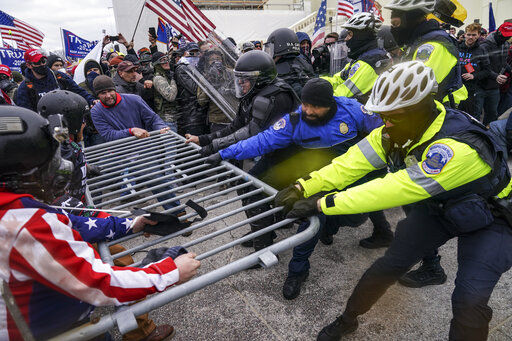Stand up for the facts!
Our only agenda is to publish the truth so you can be an informed participant in democracy.
We need your help.
I would like to contribute

Trump supporters gesture to U.S. Capitol Police in the hallway outside of the Senate chamber on Jan. 6, 2021. (AP/Manuel Balce Ceneta)
If Your Time is short
• A coup is shorthand for "coup d’etat," a French term that means the overthrow of the government. The key element of a coup is that it is carried out beyond the bounds of legality. Coups can be violent but don’t need to be.
• Some of the things Trump has done since November to contest the election are clearly within the law. Other actions of his up until Jan. 6 were close calls.
• Lawmakers objecting to the electoral vote count are acting within the rules to object, so that would not qualify as a coup.
• A good case can be made that the storming of the Capitol qualifies as a coup. It’s especially so because the rioters entered at precisely the moment when the incumbent’s loss was to be formally sealed, and they succeeded in stopping the count.
• The storming of the Capitol also would seem to qualify as sedition, which is the use of “force to prevent, hinder, or delay the execution of any law of the United States” or the authority of the U.S. government.
Are Americans witnessing a coup? Before the storming of the U.S. Capitol on Jan. 6, the case was arguable, but not a slam dunk. After the Capitol was breached, the case became more clear cut, experts say.
The questions stem from President Donald Trump’s reaction to losing the 2020 presidential election. Trump and his supporters have filed a string of lawsuits rejected by the courts, sought to strong-arm local officials into changing the results, and suggested incorrectly that Vice President Mike Pence could overturn the will of the electoral college as he presided over the counting of the ballots.
Whether the U.S. was witnessing a coup seemed speculative until the violent overrun of the House and Senate on the day the Electoral College votes were supposed to be counted, officially certifying Biden’s victory.
Here are some questions and answers on what makes a coup, as well as another concept that is increasingly being discussed, sedition.
A coup is shorthand for "coup d’etat," a French term that means the overthrow of the government. The key element of a coup is that it is carried out beyond the bounds of legality.
"We define a coup d'état as the sudden and irregular (i.e., illegal or extra-legal) removal, or displacement, of the executive authority of an independent government," wrote the Coup D’etat Project at the University of Illinois’ Cline Center for Democracy in 2013.
The Cline Center characterized 12 types of coups. Several of them aren’t relevant to the current situation, including palace coups, military coups, counter coups, foreign coups, internationally mediated transitions, and forced resignations.
Others might be, including "attempted coups" and "coup conspiracies."
Prior to the breach of the Capitol, some officials and commentators suggested that President Donald Trump, with such actions as trying to get Georgia’s secretary of state, Brad Raffensberger, to "find" enough votes for him to win the state, was effectively attempting a coup. Others said some lawmakers who opposed counting the certified Electoral College slates in Congress were creating a coup.
These actions might fall into the category of self-coups, in which the leader strong-arms other branches of government to entrench power.
"These coups involve the existing chief executive taking extreme measures to eliminate, or render powerless, other components of the government (the legislature, the judicial branch, etc.)," the 2013 Cline Center report said. "It also includes situations where the chief executive simply assumes extraordinary powers in an illegal or extra-legal manner (i.e., goes beyond extraordinary measures included in the country’s constitution, such as declaring a state of emergency)."
Trump’s call to the Georgia secretary of state might well qualify as an "extreme measure" and "illegal or extra-legal," although legal experts have said it might be a hard case to prosecute.
Multiple commentators applied the coup label to the objection to the lawmakers’ counting of the electoral votes, too.
Speaking at a Senate session to debate objections to the electoral vote count, Senate Minority Leader Chuck Schumer, D-N.Y., said, "Sadder and more dangerous still is the fact that an element of the Republican Party believes their political viability hinges on the endorsement of an attempted coup."
It may be harder to argue that the effort in Congress amounts to a coup. The law governing the counting allows for objections to be registered, debated, and, if the chambers vote them down, dispensed with. This is part of the law, not something outside it.
Police keep a watch on demonstrators who tried to break through a police barrier on Jan. 6, 2021, at the U.S. Capitol. (AP/John Minchillo)
The actions of some protestors at the U.S. Capitol, however, were clearly outside the law, especially the people who were able to reach the floor of the House and Senate and lawmakers’ personal offices.
Speaking to CNN as the Capitol was being breached, Rep. Adam Kinziger, R-Ill., said, "Anywhere else in the world, we would call this a coup attempt, and that's what I think it is." NBC News’ Lester Holt said, "There have been some elements of a coup attempt."
Are they right? Let’s start by noting that while violence is part of many coups, being violent is not a necessary condition. (At least one person reportedly died after being shot inside the Capitol.)
That said, the actions on the Capitol grounds may strengthen the case for calling this an attempted coup.
The morning the Capitol was breached, and as the House and Senate were preparing to count the electoral votes, Trump spoke in person to thousands of supporters gathered between the White House and the Washington Monument. He called the presidential election the most corrupt in the nation’s history, and he repeated the unproven claims of election fraud that have failed to find traction in courts across the country.
He told the crowd that they needed to fight for their country. "If you don't fight like hell, you're not going to have a country anymore," he said.
He closed by saying, "We're going to walk down Pennsylvania Avenue," Trump said. "We're going to try and give our Republicans, the weak ones, because the strong ones don't need any of our help, we're going to try and give them the kind of pride and boldness that they need to take back our country."
Trump ended his remarks by urging the crowd to march down Pennsylvania Avenue to Congress, suggesting that he would join them (though he didn’t). At the Capitol, some of the group stormed the building, causing the House and Senate to break off debate and leave the chamber.
Several categories of coups share some elements of this scenario, although none fit perfectly.
"Rebel coups," according to the Cline Center, require "an organized, militarized group that is actively contesting government forces," though "militarized" may be too generous a description of the disorganized groups that entered the Capitol.
Another category is "dissident actions," which involve "small groups of discontents," though the tens of thousands of protesters in Washington on Jan. 6 were probably more numerous than this category envisions.
"Popular revolts " include "irregular regime changes that are driven by widespread popular dissatisfaction with a government that is manifested by high levels of civil unrest." This doesn’t quite fit either, since the election results did not show "widespread" popular support for Trump remaining in office.
On the other hand, other elements of the actions on Jan. 6 do fit the overall definition of a coup.
A sizable number of citizens were urged by the president to move on the seat of legislative power at precisely the moment when the incumbent’s loss was to be formally sealed. The group proceeded to break laws by entering the building, causing damage inside, and forcing the electoral vote count process to halt.
All this seems to fit the category of a "sudden and irregular (i.e., illegal or extra-legal) removal, or displacement, of the executive authority of an independent government." It was sudden, laws were broken, and official functions of the government were displaced. (For this to apply, one has to envision President-elect Joe Biden as the "executive authority," rather than Trump, the incumbent but lame duck president.)
"Invading the national legislature through force sounds like a coup; peaceful protest is obviously not," said Michael Klarman, a Harvard Law School professor.
Anthony Clark Arend, a specialist in international law at Georgetown University, said that he’s skeptical of labeling the lawmakers’ challenges to the electoral vote count a coup, but he thinks it could be valid for the storming of the Capitol.
"I do think the violent actions by the protesters currently occupying part of the Capitol could be seen as a coup attempt," Arend said. "To the extent to which the president can be seen as encouraging these actions, I would argue that he is supporting a coup attempt."
Trump supporters try to break through a police barrier on Jan. 6, 2021, at the U.S. Capitol in Washington. (AP/John Minchillo)
Multiple commentators, including CNN’s Jake Tapper, have cast the actions of the protesters as sedition. Sedition is usually defined as conduct or speech inciting people to rebel against the authority of a government.
This appears to be an even clearer descriptor of the events of Jan. 6.
A seditious conspiracy is defined in federal law as two or more persons "conspir(ing) to overthrow, put down, or to destroy by force the Government of the United States, … or to oppose by force the authority thereof, or by force to prevent, hinder, or delay the execution of any law of the United States, or by force to seize, take, or possess any property of the United States contrary to the authority thereof." The law comes with a fine or imprisonment up to 20 years, or both.
The storming of the Capitol would seem to qualify as the use of "force to prevent, hinder, or delay the execution of any law of the United States" or the authority of the U.S. government.
"The people who stormed the Capitol building would seem to clearly qualify for prosecution under this provision," said Carlton Larson, a law professor at the University of California-Davis.
James Robenalt, a lawyer with an expertise in political crises, agreed. "What we are seeing is sedition," he said. "All those taking place and those in conspiracy are guilty and punishable."
Jon Greenberg contributed to this report.
Our Sources
PolitiFact, "Donald Trump says impeachment is a coup. That's Pants on Fire," Oct. 25, 2019
Cline Center for Democracy at the University of Illinois, "The Coup D’etat Project," September 2013
18 U.S. Code § 2384 - Seditious conspiracy
CNN, "Rioters breach Capitol as Congress certifies Biden’s win," Jan. 6, 2021
CNN, "Don Lemon: Trump's 'attempted coup is the real fraud here,'" Jan. 5, 2021
Poynter, "Fox News host Martha MacCallum: ‘We are witnessing something beyond our comprehension,'" Jan. 6, 2021
Tom Friedman, "Never Forget the Names of These Republicans Attempting a Coup," Jan 5, 2021
NBC News, "Trump's call with Georgia's Raffensperger could be illegal, but it would be hard to prosecute, experts say," Jan. 4, 2021
Washington Post, "With brazen assault on election, Trump prompts critics to warn of a coup," Jan. 5, 2021
Email interview with Robert F. Turner, associate director of the University of Virginia’s Center for National Security Law, Jan. 6, 2021
Email interview with Michael Klarman, a Harvard Law School professor, Jan. 6, 2021
Email interview with, Carlton Larson, a law professor at the University of California-Davis, Jan. 6, 2021
Email interview with Jack Pitney, political scientist at Claremont McKenna College, Jan. 6, 2021
Email interview with Anthony Clark Arend, professor of government and foreign service at Georgetown University, Jan. 6, 2021
Email interview with James Robenalt, lawyer at the firm Thompson Hine, Jan. 6, 2021








































